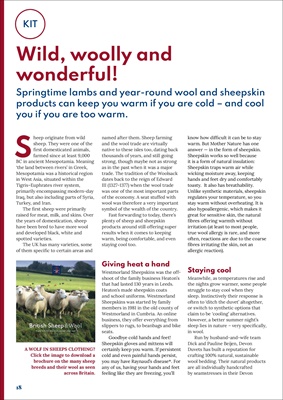
18KIT
Wild, woolly and
wonderful!
Springtime lambs and year-round wool and sheepskin
products can keep you warm if you are cold - and cool
you if you are too warm.
Sheep originate from wild
sheep. They were one of the
first domesticated animals,
farmed since at least
9,000 BC in ancient Mesopotamia.
Meaning 'the land between rivers' in
Greek, Mesopotamia was a historical
region in West Asia, situated within
the Tigris-Euphrates river system,
primarily encompassing modern-day
Iraq, but also including parts of Syria,
Turkey, and Iran.
The first sheep were primarily
raised for meat, milk, and skins. Over
the years of domestication, sheep
have been bred to have more wool
and developed black, white and
spotted varieties.
The UK has many varieties, some
of them specific to certain areas and
British SheepA guide to British sheep breeds and their unique wool
named after them. Sheep farming
and the wool trade are virtually
native to these isles too, dating back
thousands of years, and still going
strong, though maybe not as strong
as in the past when it was a major
trade. The tradition of the Woolsack
dates back to the reign of Edward
III (1327-1377) when the wool trade
was one of the most important parts
of the economy. A seat stuffed with
wool was therefore a very important
symbol of the wealth of the country.
Fast forwarding to today, there's
plenty of sheep and sheepskin
products around still offering super
results when it comes to keeping
warm, being comfortable, and even
staying cool too.
Giving heat a hand
Westmorland Sheepskins was the offshoot of
the family business Heaton's
that had lasted 130 years in Leeds.
Heaton's made sheepskin coats
and school uniforms. Westmorland
Sheepskins was started by family
members in 1981 in the old county of
Westmorland in Cumbria. An online
business, they offer everything from
slippers to rugs, to beanbags and bike
seats.
Goodbye cold hands and feet!
Sheepskin gloves and mittens will
certainly keep you warm. If persistent
cold and even painful hands persist,
you may have Raynaud's disease*. For
any of us, having your hands and feet
feeling like they are freezing, you'll
know how difficult it can be to stay
warm. But Mother Nature has one
answer - in the form of sheepskin.
Sheepskin works so well because
it is a form of natural insulation:
Sheepskin traps warm air while
wicking moisture away, keeping
hands and feet dry and comfortably
toasty. It also has breathability.
Unlike synthetic materials, sheepskin
regulates your temperature, so you
stay warm without overheating. It is
also hypoallergenic, which makes it
great for sensitive skin, the natural
fibres offering warmth without
irritation (at least to most people,
true wool allergy is rare, and more
often, reactions are due to the coarse
fibres irritating the skin, not an
allergic reaction).
Staying cool
Meanwhile, as temperatures rise and
the nights grow warmer, some people
struggle to stay cool when they
sleep. Instinctively their response is
often to 'ditch the duvet' altogether,
or switch to synthetic options that
claim to be 'cooling' alternatives.
However, a better summer night's
sleep lies in nature - very specifically,
in wool.
Run by husband-and-wife team
Dick and Pauline Beijen, Devon
Duvets has built a reputation for
crafting 100% natural, sustainable
wool bedding. Their natural products
are all individually handcrafted
by seamstresses in their Devon
A WOLF IN SHEEPS CLOTHING?
Click the image to download a
brochure on the many sheep
breeds and their wool as seen
across Britain.